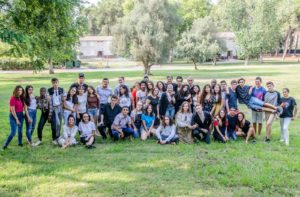A German, a Jew, and an Arab walk into an Israeli school—and learn about global conflict resolution.
This is the daily reality at Givat Haviva International School (GHIS), where a quarter of the students are Israeli Jews, another quarter Israeli Arabs, and the remaining half international students from more than 20 different countries. The diverse student body is a change of pace from the traditional Israeli school system, which mostly divides students into strictly Jewish and Arab schools.
Noga Peled, a secular Israeli Jew who previously attended a traditional religious school, said in an interview that for her attending the diverse GHIS was a difficult adjustment. In the long run, however, she said it benefited her education in ways she could have never imagined.
“At some point here I kind of realized it was hypocritical in a way talking about accepting others but not even talking to, let’s say, people from the Arab village that is literally two miles away,” she said. “It’s kind of ridiculous—the fact that we don’t interact with each other. And in a way, being here together was really, really hard, but it finally felt natural. It’s really eye-opening. I can’t imagine going back and living in the same kind of community.”
At GHIS, local Jews and Arabs not only attend class together—they live together in dorm rooms of three on the Givat Haviva campus in northern Israel along with the other half of the students who come from across the globe.
One of those students, Cedric Pasch, a German native who moved to Israel to volunteer at a kibbutz, said he was skeptical at first about sharing a room with both an Israeli Jew and Arab.
“I thought it would be hard for them to get along, but I was being prejudiced,” he said in an interview. “It went pretty well.”
GHIS, a certified international baccalaureate diploma program (IBDP), is in its second year of operation. Students attend for their eleventh and twelfth-grade years. The school’s goal is to build a community of world leaders, with a focus on conflict resolution.
Rather than placing the main academic focus on test scores, a recurring issue in many school systems, GHIS aims to provide a more well-rounded education—a core part of the IBDP curriculum, with its unique flavor of diversity in a conflict-ridden region.
Deng Kio Meyar, a twelfth-grade student at the school, is originally from South Sudan, which is in the midst of its own bloody conflict. Meyar moved to Israel when he was five, then was deported with his family to Egypt, and moved on his own in 2014 to attend a boarding school in Uganda, before returning to Israel to attend GHIS.
“From my experience here, it brings you to research, understand, analyze—and you find more opportunities,” he said of the school’s curriculum in an interview. “In this school, we have Jews, Christians, Muslims, and Buddhists also. This enabled me to know more about other parts of the world.”
Mina Dagash, a twelfth-grade student at the school, grew up in a small Arab Christian community in northern Israel and is a practicing Muslim. As a minority in Israel, Dagash said a key to moving past the deep-seated hatred in the Israeli-Palestinian conflict is for both groups to direct their anger toward to overall conflict, rather than a specific group of people.
“We’re not attacking the person, we’re attacking the situation,” she said in an interview.
When learning about global leadership, the school exposes students to different countries’ views on the conflict. One flaw in the American debate over Israel, Noga said, is the idea of there being a “pro-Israel” and “pro-Palestinian” side.
“These are not really terms we have here when we discuss the conflict,” she said of native Israelis. “When it comes to people from outside, they really take on the perspective that their environment has given them.”
The best solution to overcome this misunderstanding, said Dagash, is for more people to visit Israel.
“I think it is good to come and see and gain information of what we do here,” she said. “If you see how we do things here and how we interact with each other and how we discuss things, maybe you can find out what the problem is in your perspective.”
Givat Haviva International School currently has 108 students enrolled, all of which have a scholarship. The school is looking for more applicants, especially from the US. Recently, students began sharing their stories with over three hundred Christian college students traveling in Israel with the organization Passages.







 Sponsor a student for Christianity & National Security 2024
Sponsor a student for Christianity & National Security 2024